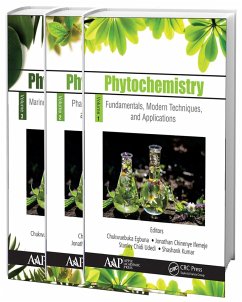Phytochemistry, 3-Volume Set
Volume 1: Fundamentals, Modern Techniques, and Applications; Volume 2: Pharmacognosy, Nanomedicine, and Contemporary Issues; Volume 3: Marine Sources, Industrial Applications, and Recent Advances
Herausgeber: Egbuna, Chukwuebuka; Udedi Chidi, Stanley; Kumar, Shashank; Sharif, Nadia; Chinenye Ifemeje, Jonathan; Vikas Kurhekar, Jaya
Schade – dieser Artikel ist leider ausverkauft. Sobald wir wissen, ob und wann der Artikel wieder verfügbar ist, informieren wir Sie an dieser Stelle.
Phytochemistry, 3-Volume Set
Volume 1: Fundamentals, Modern Techniques, and Applications; Volume 2: Pharmacognosy, Nanomedicine, and Contemporary Issues; Volume 3: Marine Sources, Industrial Applications, and Recent Advances
Herausgeber: Egbuna, Chukwuebuka; Udedi Chidi, Stanley; Kumar, Shashank; Sharif, Nadia; Chinenye Ifemeje, Jonathan; Vikas Kurhekar, Jaya
- Broschiertes Buch
- Merkliste
- Auf die Merkliste
- Bewerten Bewerten
- Teilen
- Produkt teilen
- Produkterinnerung
- Produkterinnerung
The 3-volume set, Phytochemistry, covers a wide selection of topics in phytochemistry and provides a wealth of information on the fundamentals, new applications, methods and modern analytical techniques, state-of-the-art approaches, and computational techniques. With chapters from professional specialists in their fields from around the world, the volumes deliver a comprehensive coverage of phytochemistry. Phytochemistry is a multidisciplinary field, so this book will appeal to students in both upper-level students, faculty, researchers, and industry professionals in a number of fields,…mehr
Andere Kunden interessierten sich auch für
The 3-volume set, Phytochemistry, covers a wide selection of topics in phytochemistry and provides a wealth of information on the fundamentals, new applications, methods and modern analytical techniques, state-of-the-art approaches, and computational techniques. With chapters from professional specialists in their fields from around the world, the volumes deliver a comprehensive coverage of phytochemistry. Phytochemistry is a multidisciplinary field, so this book will appeal to students in both upper-level students, faculty, researchers, and industry professionals in a number of fields, including biological science, biochemistry, pharmacy, food and medicinal chemistry, systematic botany and taxonomy, ethnobotany, conservation biology, plant genetic and metabolomics, evolutionary sciences, and plant pathology.
Produktdetails
- Produktdetails
- Verlag: Apple Academic Press Inc.
- Seitenzahl: 1728
- Erscheinungstermin: 31. März 2021
- Englisch
- Abmessung: 234mm x 156mm
- Gewicht: 3340g
- ISBN-13: 9781774635230
- ISBN-10: 1774635232
- Artikelnr.: 75650478
- Herstellerkennzeichnung
- Libri GmbH
- Europaallee 1
- 36244 Bad Hersfeld
- gpsr@libri.de
- Verlag: Apple Academic Press Inc.
- Seitenzahl: 1728
- Erscheinungstermin: 31. März 2021
- Englisch
- Abmessung: 234mm x 156mm
- Gewicht: 3340g
- ISBN-13: 9781774635230
- ISBN-10: 1774635232
- Artikelnr.: 75650478
- Herstellerkennzeichnung
- Libri GmbH
- Europaallee 1
- 36244 Bad Hersfeld
- gpsr@libri.de
Chukwuebuka Egbuna is a chartered chemist, a chemical analyst, and an academic researcher. He is a member of the Institute of Chartered Chemists of Nigeria (ICCON), the Nigerian Society of Biochemistry and Molecular Biology (NSBMB), and the Society of Quality Assurance (SQA) (USA). Jonathan Chinenye Ifemeje, PhD, is a Senior Lecturer in the Department of Biochemistry, Faculty of Natural Sciences, Chukwuemeka Odumegwu Ojukwu University, Nigeria. Stanley Udedi Chidi, PhD, is a Full Professor of Biochemistry at the Department of Applied Biochemistry, Nnamdi Azikiwe University, (UNIZIK), Awka, Nigeria. Shashank Kumar, PhD, is working as Assistant Professor at the Center for Biochemistry and Microbial Sciences, Central University of Punjab, Bathinda, India. Jaya Vikas Kurhekar, PhD (microbiology), MBA (human resources), is presently the Head and Associate Professor in Microbiology, teaching undergraduate and postgraduate students, in the Department of Microbiology at the college Dr. Patangrao Kadam Mahavidyalaya, Sangli, India. Nadia Sharif, PhD, is currently working as a Visiting Lecturer at the Biotechnology Department of Lahore College for Women, University, Lahore, Pakistan.
Phytochemistry, Volume 1: Fundamentals, Modern Techniques, and Applications
Part 1: Fundamentals Of Phytochemistry 1. Introduction to Phytochemistry 2.
Biosynthesis of Phytochemicals 3. Mechanisms of Plant Defense Against
Pathogens: Phytoalexins Induction 4. Biological Roles of Phytochemicals 5.
Phytochemicals as Immunomodulators 6. Phytochemicals as Nutraceuticals and
Pharmafoods 7. The Role of Phytochemistry in Plant Classification:
Phytochemotaxonomy 8. Plant Metabolomics Part 2: Methods And Techniques 9.
Phytochemical Extraction, Isolation and Detection Techniques 10. Techniques
in Phytochemotaxonomy 11. Chromatographical Techniques in Phytochemical
Research 12. UV/Visible Spectroscopy and HPLC in Phytochemical Analysis: An
Introduction 13. HPLC and HPTLC as Sophisticated Tools in Phytochemical
Analysis 14. Analytical Techniques in Elemental Profiling 15. Phytochemical
Test Methods 16. Animal Models in Phytopharmacology 17. Toxicological
Testing of Plant Products 18. Role of Biostatistics in Phytochemical
Research: Emphasis on Essential Oil Studies Part 3: Computational
Phytochemistry 19. Computational Phytochemistry in Drug Discovery:
Databases and Tools 20. Stemness Modulation by Phytochemicals to Target
Cancer Stem Cells 21. Targeting Cancer Cell Carbohydrate Metabolism by
Phytochemicals 22. Herbal Drug Discovery: The Envision Biotechnology
Approach Part 4: Phytochemical Research 23. GC-MS Analysis and In Vitro
Anticancer Activity of Tectona grandis Bark Extract Against Human Breast
Cancer Cell Line (MCF-7) 24. Phytochemical Analysis of Nigella sativa L.
Seeds Aqueous Extract by GC-MS and FTIR 25. Phytochemical Studies on Five
Nigerian Indigenous Vegetables Phytochemistry, Volume 2: Pharmacognosy,
Nanomedicine, and Contemporary Issues Part 1: Ethnomedicine And
Pharmacognosy 1. Pharmacognosy and Prehistoric Uses of Medicinal Plants 2.
Complementary and Alternative Systems of Medicines 3. Ethnobotanical Study
of Indigenous Peoples' Medicinal Plants 4. Herbal Medicine: A Case Study of
Nigerian Medicinal Plants 5. Plant Species Utilized for Ethnoveterinary
Practices in India Part 2: Medicinal Potentials Of Phytochemicals 6.
Antioxidants and Phytochemicals 7. Roles of Phytochemicals in the
Prevention and Treatment of Various Diseases 8. Phytochemicals as Oxidative
Stress Mitigators 9. Antimicrobial Medicinal Plants as Effective Natural
Bioresources 10. Medicinal Plants with Anti-Venom Activities 11. Medicinal
Potentials of Green Tea 12. Antioxidant Potentials of Cinnamon 13.
Phytochemical as the Hope for the Treatment of Hepatic and Neuronal
Disorders 14. Role of Phytochemicals in the Treatment of Male Infertility
15. Roles of Medicinal Plants in the Treatment of Cancer 16. Methylated
Flavonoids as a Novel Inhibitor of Metastasis in the Cancer Cell 17.
Medicinal Roles of Phytomolecules in the Treatment and Management of
Diabetes Mellitus 18. Roles of Phytomolecules in the Treatment of Diabetic
Nephropathy 19. Phytochemicals as Protagonist for the Treatment and
Management of Autoimmune Diseases Part 3: Nanoparticle Biosynthesis And Its
Biomedical Applicationsm 20. Green Biosynthesis of Metallic Nanoparticles
21. Cytotoxicity and Biomedical Applications of Metal Oxide Nanoparticles
Synthesized from Plants 22. Biosynthesis of Carbon Dot's Nanoparticles from
Plants Part 4: Phytochemicals As Friends And Foes 23. Toxic Plants and
Phytochemicals 24. Phytochemicals as Prooxidants 25. Phytochemical as an
Antinutrient Phytochemistry, Volume 3: Marine Sources, Industrial
Applications, and Recent Advances Part 1: Marine Sources Of Secondary
Metabolites 1. Phytochemicals of Marine Origin 2. Marine Sponge Alkaloids:
A Source of Novel Anticancer Agent 3. Marine Antioxidants and Assay Methods
4. Extraction of Marine Phytochemicals: Methods and Techniques Part 2:
Industrial And Medicinal Applications Of Phytochemicals 5. Biotechnology
Approach to the Production of Phytochemicals: An Introduction 6. Secondary
Metabolites Accumulation and Production through In Vitro Cultures 7.
Practical Processes Involved in the Production of Phytochemicals by Plant
Tissue Culture 8. Medicinal and Industrial Applications of Bromelain 9.
Cysteine Proteases from Plants and Its Applications 10. Phytotherapy and
Encapsulation 11. Effective Processing Methods for Fruits and Vegetables
Part 3: Environmental Concerns And Eco-Friendly Control Measures 12.
Effects of Environmental Factors on the Accumulation of Phytochemicals in
Plants 13. Effects of Environment on the Chemical Constituents and
Biological Characteristics of Some Medicinal Plants 14. Phytochelatins and
Heavy Metal Tolerance in Plants 15. Phytochemical Biopesticides 16.
Sustainable Approach in Integrated Pest Management: Role of Phytomolecules
as Biopesticide 17. Essential Oil in Pest Control and Disease Management
18. Inhibition of Mild Steel Corrosion in Acidic Media by Phytochemicals
Part 4: Recent Advances 19. Novel Terpenoids as Anticancer Stem Cell Agents
20. Evaluation of the Phytohemagglutinin Activities of Echinacea Species in
Ontogenesis
Part 1: Fundamentals Of Phytochemistry 1. Introduction to Phytochemistry 2.
Biosynthesis of Phytochemicals 3. Mechanisms of Plant Defense Against
Pathogens: Phytoalexins Induction 4. Biological Roles of Phytochemicals 5.
Phytochemicals as Immunomodulators 6. Phytochemicals as Nutraceuticals and
Pharmafoods 7. The Role of Phytochemistry in Plant Classification:
Phytochemotaxonomy 8. Plant Metabolomics Part 2: Methods And Techniques 9.
Phytochemical Extraction, Isolation and Detection Techniques 10. Techniques
in Phytochemotaxonomy 11. Chromatographical Techniques in Phytochemical
Research 12. UV/Visible Spectroscopy and HPLC in Phytochemical Analysis: An
Introduction 13. HPLC and HPTLC as Sophisticated Tools in Phytochemical
Analysis 14. Analytical Techniques in Elemental Profiling 15. Phytochemical
Test Methods 16. Animal Models in Phytopharmacology 17. Toxicological
Testing of Plant Products 18. Role of Biostatistics in Phytochemical
Research: Emphasis on Essential Oil Studies Part 3: Computational
Phytochemistry 19. Computational Phytochemistry in Drug Discovery:
Databases and Tools 20. Stemness Modulation by Phytochemicals to Target
Cancer Stem Cells 21. Targeting Cancer Cell Carbohydrate Metabolism by
Phytochemicals 22. Herbal Drug Discovery: The Envision Biotechnology
Approach Part 4: Phytochemical Research 23. GC-MS Analysis and In Vitro
Anticancer Activity of Tectona grandis Bark Extract Against Human Breast
Cancer Cell Line (MCF-7) 24. Phytochemical Analysis of Nigella sativa L.
Seeds Aqueous Extract by GC-MS and FTIR 25. Phytochemical Studies on Five
Nigerian Indigenous Vegetables Phytochemistry, Volume 2: Pharmacognosy,
Nanomedicine, and Contemporary Issues Part 1: Ethnomedicine And
Pharmacognosy 1. Pharmacognosy and Prehistoric Uses of Medicinal Plants 2.
Complementary and Alternative Systems of Medicines 3. Ethnobotanical Study
of Indigenous Peoples' Medicinal Plants 4. Herbal Medicine: A Case Study of
Nigerian Medicinal Plants 5. Plant Species Utilized for Ethnoveterinary
Practices in India Part 2: Medicinal Potentials Of Phytochemicals 6.
Antioxidants and Phytochemicals 7. Roles of Phytochemicals in the
Prevention and Treatment of Various Diseases 8. Phytochemicals as Oxidative
Stress Mitigators 9. Antimicrobial Medicinal Plants as Effective Natural
Bioresources 10. Medicinal Plants with Anti-Venom Activities 11. Medicinal
Potentials of Green Tea 12. Antioxidant Potentials of Cinnamon 13.
Phytochemical as the Hope for the Treatment of Hepatic and Neuronal
Disorders 14. Role of Phytochemicals in the Treatment of Male Infertility
15. Roles of Medicinal Plants in the Treatment of Cancer 16. Methylated
Flavonoids as a Novel Inhibitor of Metastasis in the Cancer Cell 17.
Medicinal Roles of Phytomolecules in the Treatment and Management of
Diabetes Mellitus 18. Roles of Phytomolecules in the Treatment of Diabetic
Nephropathy 19. Phytochemicals as Protagonist for the Treatment and
Management of Autoimmune Diseases Part 3: Nanoparticle Biosynthesis And Its
Biomedical Applicationsm 20. Green Biosynthesis of Metallic Nanoparticles
21. Cytotoxicity and Biomedical Applications of Metal Oxide Nanoparticles
Synthesized from Plants 22. Biosynthesis of Carbon Dot's Nanoparticles from
Plants Part 4: Phytochemicals As Friends And Foes 23. Toxic Plants and
Phytochemicals 24. Phytochemicals as Prooxidants 25. Phytochemical as an
Antinutrient Phytochemistry, Volume 3: Marine Sources, Industrial
Applications, and Recent Advances Part 1: Marine Sources Of Secondary
Metabolites 1. Phytochemicals of Marine Origin 2. Marine Sponge Alkaloids:
A Source of Novel Anticancer Agent 3. Marine Antioxidants and Assay Methods
4. Extraction of Marine Phytochemicals: Methods and Techniques Part 2:
Industrial And Medicinal Applications Of Phytochemicals 5. Biotechnology
Approach to the Production of Phytochemicals: An Introduction 6. Secondary
Metabolites Accumulation and Production through In Vitro Cultures 7.
Practical Processes Involved in the Production of Phytochemicals by Plant
Tissue Culture 8. Medicinal and Industrial Applications of Bromelain 9.
Cysteine Proteases from Plants and Its Applications 10. Phytotherapy and
Encapsulation 11. Effective Processing Methods for Fruits and Vegetables
Part 3: Environmental Concerns And Eco-Friendly Control Measures 12.
Effects of Environmental Factors on the Accumulation of Phytochemicals in
Plants 13. Effects of Environment on the Chemical Constituents and
Biological Characteristics of Some Medicinal Plants 14. Phytochelatins and
Heavy Metal Tolerance in Plants 15. Phytochemical Biopesticides 16.
Sustainable Approach in Integrated Pest Management: Role of Phytomolecules
as Biopesticide 17. Essential Oil in Pest Control and Disease Management
18. Inhibition of Mild Steel Corrosion in Acidic Media by Phytochemicals
Part 4: Recent Advances 19. Novel Terpenoids as Anticancer Stem Cell Agents
20. Evaluation of the Phytohemagglutinin Activities of Echinacea Species in
Ontogenesis
Phytochemistry, Volume 1: Fundamentals, Modern Techniques, and Applications
Part 1: Fundamentals Of Phytochemistry 1. Introduction to Phytochemistry 2.
Biosynthesis of Phytochemicals 3. Mechanisms of Plant Defense Against
Pathogens: Phytoalexins Induction 4. Biological Roles of Phytochemicals 5.
Phytochemicals as Immunomodulators 6. Phytochemicals as Nutraceuticals and
Pharmafoods 7. The Role of Phytochemistry in Plant Classification:
Phytochemotaxonomy 8. Plant Metabolomics Part 2: Methods And Techniques 9.
Phytochemical Extraction, Isolation and Detection Techniques 10. Techniques
in Phytochemotaxonomy 11. Chromatographical Techniques in Phytochemical
Research 12. UV/Visible Spectroscopy and HPLC in Phytochemical Analysis: An
Introduction 13. HPLC and HPTLC as Sophisticated Tools in Phytochemical
Analysis 14. Analytical Techniques in Elemental Profiling 15. Phytochemical
Test Methods 16. Animal Models in Phytopharmacology 17. Toxicological
Testing of Plant Products 18. Role of Biostatistics in Phytochemical
Research: Emphasis on Essential Oil Studies Part 3: Computational
Phytochemistry 19. Computational Phytochemistry in Drug Discovery:
Databases and Tools 20. Stemness Modulation by Phytochemicals to Target
Cancer Stem Cells 21. Targeting Cancer Cell Carbohydrate Metabolism by
Phytochemicals 22. Herbal Drug Discovery: The Envision Biotechnology
Approach Part 4: Phytochemical Research 23. GC-MS Analysis and In Vitro
Anticancer Activity of Tectona grandis Bark Extract Against Human Breast
Cancer Cell Line (MCF-7) 24. Phytochemical Analysis of Nigella sativa L.
Seeds Aqueous Extract by GC-MS and FTIR 25. Phytochemical Studies on Five
Nigerian Indigenous Vegetables Phytochemistry, Volume 2: Pharmacognosy,
Nanomedicine, and Contemporary Issues Part 1: Ethnomedicine And
Pharmacognosy 1. Pharmacognosy and Prehistoric Uses of Medicinal Plants 2.
Complementary and Alternative Systems of Medicines 3. Ethnobotanical Study
of Indigenous Peoples' Medicinal Plants 4. Herbal Medicine: A Case Study of
Nigerian Medicinal Plants 5. Plant Species Utilized for Ethnoveterinary
Practices in India Part 2: Medicinal Potentials Of Phytochemicals 6.
Antioxidants and Phytochemicals 7. Roles of Phytochemicals in the
Prevention and Treatment of Various Diseases 8. Phytochemicals as Oxidative
Stress Mitigators 9. Antimicrobial Medicinal Plants as Effective Natural
Bioresources 10. Medicinal Plants with Anti-Venom Activities 11. Medicinal
Potentials of Green Tea 12. Antioxidant Potentials of Cinnamon 13.
Phytochemical as the Hope for the Treatment of Hepatic and Neuronal
Disorders 14. Role of Phytochemicals in the Treatment of Male Infertility
15. Roles of Medicinal Plants in the Treatment of Cancer 16. Methylated
Flavonoids as a Novel Inhibitor of Metastasis in the Cancer Cell 17.
Medicinal Roles of Phytomolecules in the Treatment and Management of
Diabetes Mellitus 18. Roles of Phytomolecules in the Treatment of Diabetic
Nephropathy 19. Phytochemicals as Protagonist for the Treatment and
Management of Autoimmune Diseases Part 3: Nanoparticle Biosynthesis And Its
Biomedical Applicationsm 20. Green Biosynthesis of Metallic Nanoparticles
21. Cytotoxicity and Biomedical Applications of Metal Oxide Nanoparticles
Synthesized from Plants 22. Biosynthesis of Carbon Dot's Nanoparticles from
Plants Part 4: Phytochemicals As Friends And Foes 23. Toxic Plants and
Phytochemicals 24. Phytochemicals as Prooxidants 25. Phytochemical as an
Antinutrient Phytochemistry, Volume 3: Marine Sources, Industrial
Applications, and Recent Advances Part 1: Marine Sources Of Secondary
Metabolites 1. Phytochemicals of Marine Origin 2. Marine Sponge Alkaloids:
A Source of Novel Anticancer Agent 3. Marine Antioxidants and Assay Methods
4. Extraction of Marine Phytochemicals: Methods and Techniques Part 2:
Industrial And Medicinal Applications Of Phytochemicals 5. Biotechnology
Approach to the Production of Phytochemicals: An Introduction 6. Secondary
Metabolites Accumulation and Production through In Vitro Cultures 7.
Practical Processes Involved in the Production of Phytochemicals by Plant
Tissue Culture 8. Medicinal and Industrial Applications of Bromelain 9.
Cysteine Proteases from Plants and Its Applications 10. Phytotherapy and
Encapsulation 11. Effective Processing Methods for Fruits and Vegetables
Part 3: Environmental Concerns And Eco-Friendly Control Measures 12.
Effects of Environmental Factors on the Accumulation of Phytochemicals in
Plants 13. Effects of Environment on the Chemical Constituents and
Biological Characteristics of Some Medicinal Plants 14. Phytochelatins and
Heavy Metal Tolerance in Plants 15. Phytochemical Biopesticides 16.
Sustainable Approach in Integrated Pest Management: Role of Phytomolecules
as Biopesticide 17. Essential Oil in Pest Control and Disease Management
18. Inhibition of Mild Steel Corrosion in Acidic Media by Phytochemicals
Part 4: Recent Advances 19. Novel Terpenoids as Anticancer Stem Cell Agents
20. Evaluation of the Phytohemagglutinin Activities of Echinacea Species in
Ontogenesis
Part 1: Fundamentals Of Phytochemistry 1. Introduction to Phytochemistry 2.
Biosynthesis of Phytochemicals 3. Mechanisms of Plant Defense Against
Pathogens: Phytoalexins Induction 4. Biological Roles of Phytochemicals 5.
Phytochemicals as Immunomodulators 6. Phytochemicals as Nutraceuticals and
Pharmafoods 7. The Role of Phytochemistry in Plant Classification:
Phytochemotaxonomy 8. Plant Metabolomics Part 2: Methods And Techniques 9.
Phytochemical Extraction, Isolation and Detection Techniques 10. Techniques
in Phytochemotaxonomy 11. Chromatographical Techniques in Phytochemical
Research 12. UV/Visible Spectroscopy and HPLC in Phytochemical Analysis: An
Introduction 13. HPLC and HPTLC as Sophisticated Tools in Phytochemical
Analysis 14. Analytical Techniques in Elemental Profiling 15. Phytochemical
Test Methods 16. Animal Models in Phytopharmacology 17. Toxicological
Testing of Plant Products 18. Role of Biostatistics in Phytochemical
Research: Emphasis on Essential Oil Studies Part 3: Computational
Phytochemistry 19. Computational Phytochemistry in Drug Discovery:
Databases and Tools 20. Stemness Modulation by Phytochemicals to Target
Cancer Stem Cells 21. Targeting Cancer Cell Carbohydrate Metabolism by
Phytochemicals 22. Herbal Drug Discovery: The Envision Biotechnology
Approach Part 4: Phytochemical Research 23. GC-MS Analysis and In Vitro
Anticancer Activity of Tectona grandis Bark Extract Against Human Breast
Cancer Cell Line (MCF-7) 24. Phytochemical Analysis of Nigella sativa L.
Seeds Aqueous Extract by GC-MS and FTIR 25. Phytochemical Studies on Five
Nigerian Indigenous Vegetables Phytochemistry, Volume 2: Pharmacognosy,
Nanomedicine, and Contemporary Issues Part 1: Ethnomedicine And
Pharmacognosy 1. Pharmacognosy and Prehistoric Uses of Medicinal Plants 2.
Complementary and Alternative Systems of Medicines 3. Ethnobotanical Study
of Indigenous Peoples' Medicinal Plants 4. Herbal Medicine: A Case Study of
Nigerian Medicinal Plants 5. Plant Species Utilized for Ethnoveterinary
Practices in India Part 2: Medicinal Potentials Of Phytochemicals 6.
Antioxidants and Phytochemicals 7. Roles of Phytochemicals in the
Prevention and Treatment of Various Diseases 8. Phytochemicals as Oxidative
Stress Mitigators 9. Antimicrobial Medicinal Plants as Effective Natural
Bioresources 10. Medicinal Plants with Anti-Venom Activities 11. Medicinal
Potentials of Green Tea 12. Antioxidant Potentials of Cinnamon 13.
Phytochemical as the Hope for the Treatment of Hepatic and Neuronal
Disorders 14. Role of Phytochemicals in the Treatment of Male Infertility
15. Roles of Medicinal Plants in the Treatment of Cancer 16. Methylated
Flavonoids as a Novel Inhibitor of Metastasis in the Cancer Cell 17.
Medicinal Roles of Phytomolecules in the Treatment and Management of
Diabetes Mellitus 18. Roles of Phytomolecules in the Treatment of Diabetic
Nephropathy 19. Phytochemicals as Protagonist for the Treatment and
Management of Autoimmune Diseases Part 3: Nanoparticle Biosynthesis And Its
Biomedical Applicationsm 20. Green Biosynthesis of Metallic Nanoparticles
21. Cytotoxicity and Biomedical Applications of Metal Oxide Nanoparticles
Synthesized from Plants 22. Biosynthesis of Carbon Dot's Nanoparticles from
Plants Part 4: Phytochemicals As Friends And Foes 23. Toxic Plants and
Phytochemicals 24. Phytochemicals as Prooxidants 25. Phytochemical as an
Antinutrient Phytochemistry, Volume 3: Marine Sources, Industrial
Applications, and Recent Advances Part 1: Marine Sources Of Secondary
Metabolites 1. Phytochemicals of Marine Origin 2. Marine Sponge Alkaloids:
A Source of Novel Anticancer Agent 3. Marine Antioxidants and Assay Methods
4. Extraction of Marine Phytochemicals: Methods and Techniques Part 2:
Industrial And Medicinal Applications Of Phytochemicals 5. Biotechnology
Approach to the Production of Phytochemicals: An Introduction 6. Secondary
Metabolites Accumulation and Production through In Vitro Cultures 7.
Practical Processes Involved in the Production of Phytochemicals by Plant
Tissue Culture 8. Medicinal and Industrial Applications of Bromelain 9.
Cysteine Proteases from Plants and Its Applications 10. Phytotherapy and
Encapsulation 11. Effective Processing Methods for Fruits and Vegetables
Part 3: Environmental Concerns And Eco-Friendly Control Measures 12.
Effects of Environmental Factors on the Accumulation of Phytochemicals in
Plants 13. Effects of Environment on the Chemical Constituents and
Biological Characteristics of Some Medicinal Plants 14. Phytochelatins and
Heavy Metal Tolerance in Plants 15. Phytochemical Biopesticides 16.
Sustainable Approach in Integrated Pest Management: Role of Phytomolecules
as Biopesticide 17. Essential Oil in Pest Control and Disease Management
18. Inhibition of Mild Steel Corrosion in Acidic Media by Phytochemicals
Part 4: Recent Advances 19. Novel Terpenoids as Anticancer Stem Cell Agents
20. Evaluation of the Phytohemagglutinin Activities of Echinacea Species in
Ontogenesis




